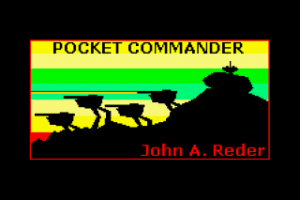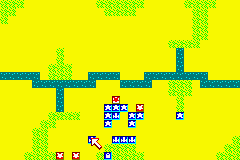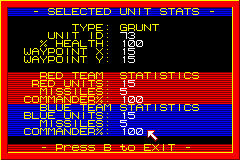More actions
No edit summary |
No edit summary |
||
| Line 1: | Line 1: | ||
{{Infobox GBA Homebrews | {{Infobox GBA Homebrews | ||
|title=Pocket Commander | |title=Pocket Commander | ||
|image= | |image=pocketcommander02.png | ||
|description=A real time strategy game modeled after the 20 year old classic video game Modem Wars. | |description=A real time strategy game modeled after the 20 year old classic video game Modem Wars. | ||
|author=John A. Reder | |author=John A. Reder | ||
| Line 16: | Line 10: | ||
|download=https://dlhb.gamebrew.org/gbahomebrews/pocketcommander.7z | |download=https://dlhb.gamebrew.org/gbahomebrews/pocketcommander.7z | ||
|website=http://www.tacticalneuronics.com/content/PocketCommander.asp | |website=http://www.tacticalneuronics.com/content/PocketCommander.asp | ||
}} | }} | ||
{{#seo: | |||
|title= (Strategy) - GameBrew | |||
|title_mode=append | |||
|image=pocketcommander2.png | |||
|image_alt=Pocket Commander | |||
}} | |||
Pocket Commander is a real time strategy game inspired by Modem Wars by Dan Bunten released in 1988. | Pocket Commander is a real time strategy game inspired by Modem Wars by Dan Bunten released in 1988. | ||
Revision as of 09:04, 11 September 2022
| Pocket Commander | |
|---|---|
 | |
| General | |
| Author | John A. Reder |
| Type | Strategy |
| Version | 1.0.3 |
| License | Mixed |
| Last Updated | 2011/02/23 |
| Links | |
| Download | |
| Website | |
Pocket Commander is a real time strategy game inspired by Modem Wars by Dan Bunten released in 1988.
It was created to pay tribute to Dan for his much-overlooked masterpiece. Long before the internet craze and real-time strategy (RTS) games like Command and Conquer, Dan created the first multiplayer (Modem to modem) real-time strategy game. This game is an attempt to recapture those 20 year old memories in a single player game for the GameBoy Advance.
User guide
Your goal is to win. Knock out your opponent's commander, which is the brains of the operation. No brains, no operation. A commander is knocked out when its energy level goes to zero as a result of enemy attack. You'll use your robots and your commander's weapons to accomplish this.
Your commander is your remote eyes and ears. It along with your robot army are controlled by you. You have in your possession a pocket-sized hand-held command device designed to communicate directly to your command vehicle (Commander) and your robot army. Your commander transmits its visual signal to your hand-held device.
Once your commander is destroyed you will loose this signal along with all communication with your army, therefore you loose the battle. Note that when your commander takes damage, your signal may be temporarily disrupted. If you notice this disruption, it is a good indicator that you might want to get your commander out of danger or at least send in some help.
Playing field:
- The size of the playing field is 30 spaces by 20 spaces.
- A space is the area a robot occupies.
- Each space can accommodate only one robot at a time and each space can be made up of only one type of terrain.
The types of terrain are:
- Plain - Conatins no obstacles.
- Forest - Slows movement and hides robots. Reduces range of fire in most cases.
- Stream - Slows movement. Robots hit while in stream take extra damage.
Your Tactical Console shows the entire battlefield. You'll spend most of your time on this screen, maneuvering your forces and keeping your eye on the big picture.
Here's a complete list of robots you'll use in Pocket Commander. Note that you can't make robots shoot (with the exception of the Commander); they pick and shoot at the enemy when they're in range.
- GRUNT - Your basic foot soldier. Unlimited Ammo.
- MORTAR - Your big guns; they do the most damage. Unlimited Ammo.
- COMMANDER - Your headquarters. You lose the game if this gets knocked out. Each Commander starts the game with a pre determined number of missiles based on the scenario selected.
To move your robots:
- Put the cursor (the red/white arrow) on top of the robot and press A.
- It changes to a boxed icon for a brief moment and you should then hear a beep.
- Position the cursor anywhere on the map to set its waypoint and press A to start the robot moving.
- You can also select more robots to form a group order.
- Select any or all robots one after the other to form a group, then click anywhere else on the map to assign a single waypoint for all group members to travel to.
- Subsequent clicks on the map will update their waypoint assignment.
You can check your resources in the Stats Console. Look at the Stats for the current robot selected, and current team totals for both teams.
Go to the Missile Radar Console to select a target for your Commanders missiles.
- Each Commander starts with a missile count determined by the scenario selected.
- They do the most damage in the center of the target and inflict splash damage to other robots close by including robots on your own team, so be careful.
- Note that the Commander cannot hurt itself with its own missiles.
Go for the win. If you happened to spot the enemy Commander, send your robots after it and knock it out for an immediate victory (your robots will automatically shoot when the enemy is in range).
Technical information
This section contains technical information. If you want the winning edge, this is recommended reading.
Robot health:
- Robots start the game fully charged (Health=100%).
- They lose health whenever they're shot, or missiled.
- When health drops to zero as a result of an attack, they're out of the game and zapped off the battlefield.
- When the Commander loses all its health it's knocked out.
- All you can do is hope that its health doesn't hit zero before the battle's over.
Robot speed:
- There are three speed categories.
- The Space Per Turn figures are for robots moving through open terrain.
- See Effects of Terrain for details on how certain terrain slow your robot's movements.
Effects of terrain:
| Type | Effect on Movement | Effect on Sighting | Effect on Combat |
|---|---|---|---|
| Plain | None. | Full range 3 spaces Grunt, 5 spaces Mortar. | None. |
| Stream | Move at 1/3 speed. | Can only see 2 space away. | Target in stream receives damages x 2. |
| Forest | Move at 1/2 speed. | Can be spotted only by adjacent enemy; can only see robots one space away. | Grunts and Mortars only fire at robots adjacent to them. |
Robot sighting:
| Vision Range (Open Plain, Stream, Forest) | |||
|---|---|---|---|
| Grunt | 3 | 2 | 1 |
| Mortar | 5 | 2 | 1 |
| Commander | 3 | 2 | 1 |
| Radar/Missile | All visible units can bee seen and targeted, a commander can target any space on the map. | ||
Robot weapon range:
- Each robot has a weapon they'll shoot when the enemy's close enough to see.
- Terrain can effect a robot's shooting range, so be sure to refer to Effects of Terrain in this section of details.
- A robot may only fire once per turn.
Damage from enemy fire:
- Damage that your robot takes depends on who's giving and who's getting.
- This table shows the percentage of damage a robot inflicts when it hits its target.
- The numbers under the Commander column Target represent its Missile strikes.
| Damage to Health Table (by percent) | |||
|---|---|---|---|
| Shooter | Target (Grunt, Mortar, Commander) | ||
| Grunt | 4 | 25 | 6 |
| Mortar | 12 | 8 | 10 |
| Commander - Missile Direct | 24 | 24 | 12 |
| Commander -Missile Splash | 16 | 16 | 4 |
Points are awarded for damage inflicted to the enemy (deducted for missile damage to your own team). Your score is zero if you loose the battle.
Map Waypoints:
- The following grid is used when assigning waypoints.
- When viewing the statistics for the last selected robot you can see its waypoint assignment.
- This grid should help you understand the X and Y values shown. It uses the example below:
- waypoint X 12
- waypoint Y 20
| Grid table |
|---|
- Y -
1 1 1 1 1 1 1 1 1 1 2 2 2 2 2 2 2 2 2 2
0 1 2 3 4 5 6 7 8 9 0 1 2 3 4 5 6 7 8 9 0 1 2 3 4 5 6 7 8 9
-+-+-+-+-+-+-+-+-+-+-+-+-+-+-+-+-+-+-+-+-+-+-+-+-+-+-+-+-+-+
0 | | | | | | | | | | | | | | | | | | | | | | | | | | | | | |
-+-+-+-+-+-+-+-+-+-+-+-+-+-+-+-+-+-+-+-+-+-+-+-+-+-+-+-+-+-+
1 | | | | | | | | | | | | | | | | | | | | | | | | | | | | | |
-+-+-+-+-+-+-+-+-+-+-+-+-+-+-+-+-+-+-+-+-+-+-+-+-+-+-+-+-+-+
2 | | | | | | | | | | | | | | | | | | | | | | | | | | | | | |
-+-+-+-+-+-+-+-+-+-+-+-+-+-+-+-+-+-+-+-+-+-+-+-+-+-+-+-+-+-+
3 | | | | | | | | | | | | | | | | | | | | | | | | | | | | | |
-+-+-+-+-+-+-+-+-+-+-+-+-+-+-+-+-+-+-+-+-+-+-+-+-+-+-+-+-+-+
4 | | | | | | | | | | | | | | | | | | | | | | | | | | | | | |
-+-+-+-+-+-+-+-+-+-+-+-+-+-+-+-+-+-+-+-+-+-+-+-+-+-+-+-+-+-+
5 | | | | | | | | | | | | | | | | | | | | | | | | | | | | | |
-+-+-+-+-+-+-+-+-+-+-+-+-+-+-+-+-+-+-+-+-+-+-+-+-+-+-+-+-+-+
6 | | | | | | | | | | | | | | | | | | | | | | | | | | | | | |
-+-+-+-+-+-+-+-+-+-+-+-+-+-+-+-+-+-+-+-+-+-+-+-+-+-+-+-+-+-+
7 | | | | | | | | | | | | | | | | | | | | | | | | | | | | | |
-+-+-+-+-+-+-+-+-+-+-+-+-+-+-+-+-+-+-+-+-+-+-+-+-+-+-+-+-+-+
8 | | | | | | | | | | | | | | | | | | | | | | | | | | | | | |
-+-+-+-+-+-+-+-+-+-+-+-+-+-+-+-+-+-+-+-+-+-+-+-+-+-+-+-+-+-+
-X- 9 | | | | | | | | | | | | | | | | | | | | | | | | | | | | | |
-+-+-+-+-+-+-+-+-+-+-+-+-+-+-+-+-+-+-+-+-+-+-+-+-+-+-+-+-+-+
10 | | | | | | | | | | | | | | | | | | | | | | | | | | | | | |
-+-+-+-+-+-+-+-+-+-+-+-+-+-+-+-+-+-+-+-+-+-+-+-+-+-+-+-+-+-+
11 | | | | | | | | | | | | | | | | | | | | | | | | | | | | | |
-+-+-+-+-+-+-+-+-+-+-+-+-+-+-+-+-+-+-+-+-+-+-+-+-+-+-+-+-+-+
12 | | | | | | | | | | | | | | | | | | | |x| | | | | | | | | |
-+-+-+-+-+-+-+-+-+-+-+-+-+-+-+-+-+-+-+-+-+-+-+-+-+-+-+-+-+-+
13 | | | | | | | | | | | | | | | | | | | | | | | | | | | | | |
-+-+-+-+-+-+-+-+-+-+-+-+-+-+-+-+-+-+-+-+-+-+-+-+-+-+-+-+-+-+
14 | | | | | | | | | | | | | | | | | | | | | | | | | | | | | |
-+-+-+-+-+-+-+-+-+-+-+-+-+-+-+-+-+-+-+-+-+-+-+-+-+-+-+-+-+-+
15 | | | | | | | | | | | | | | | | | | | | | | | | | | | | | |
-+-+-+-+-+-+-+-+-+-+-+-+-+-+-+-+-+-+-+-+-+-+-+-+-+-+-+-+-+-+
16 | | | | | | | | | | | | | | | | | | | | | | | | | | | | | |
-+-+-+-+-+-+-+-+-+-+-+-+-+-+-+-+-+-+-+-+-+-+-+-+-+-+-+-+-+-+
17 | | | | | | | | | | | | | | | | | | | | | | | | | | | | | |
-+-+-+-+-+-+-+-+-+-+-+-+-+-+-+-+-+-+-+-+-+-+-+-+-+-+-+-+-+-+
18 | | | | | | | | | | | | | | | | | | | | | | | | | | | | | |
-+-+-+-+-+-+-+-+-+-+-+-+-+-+-+-+-+-+-+-+-+-+-+-+-+-+-+-+-+-+
19 | | | | | | | | | | | | | | | | | | | | | | | | | | | | | |
-+-+-+-+-+-+-+-+-+-+-+-+-+-+-+-+-+-+-+-+-+-+-+-+-+-+-+-+-+-+
|
FAQ
Q. Why can't I see my opponent's robots on the Battle console?
They're too far away. You can only see the enemy robots when they're within a certain range of your robots (the exact ranges are listed under "Robot Sighting" in the Technical Information section) or when they're firing on you.
Q. How do I make my robots shoot?
You can't. Robots pick their own enemy targets to shoot at.
The one exception is that you can select a target for your Commander in the Missile Radar Console
Q. Why are there no missiles?
You used them all up. Check your Stats console (B) to see how many you have left.
Q. Why won't the missile fire when I tell it to?
The Radar unit in your Commander isn't perfect, keep trying to fire; sometimes all it takes a couple of tries and a little luck.
Controls
Left/Right - Scroll through options
A - Select option
Hold D-Pad - Increase the cursor speed
B - Stats
Select - Help
Start - Credits
R - Missile Radar, Return to Tactical console
Screenshots


Compatibility
You can run it with a GameBoy Advance emulator or install the ROM onto a flash cartridge for use on a GameBoy Advance.
External links
- Author's website - http://www.tacticalneuronics.com/content/PocketCommander.asp
